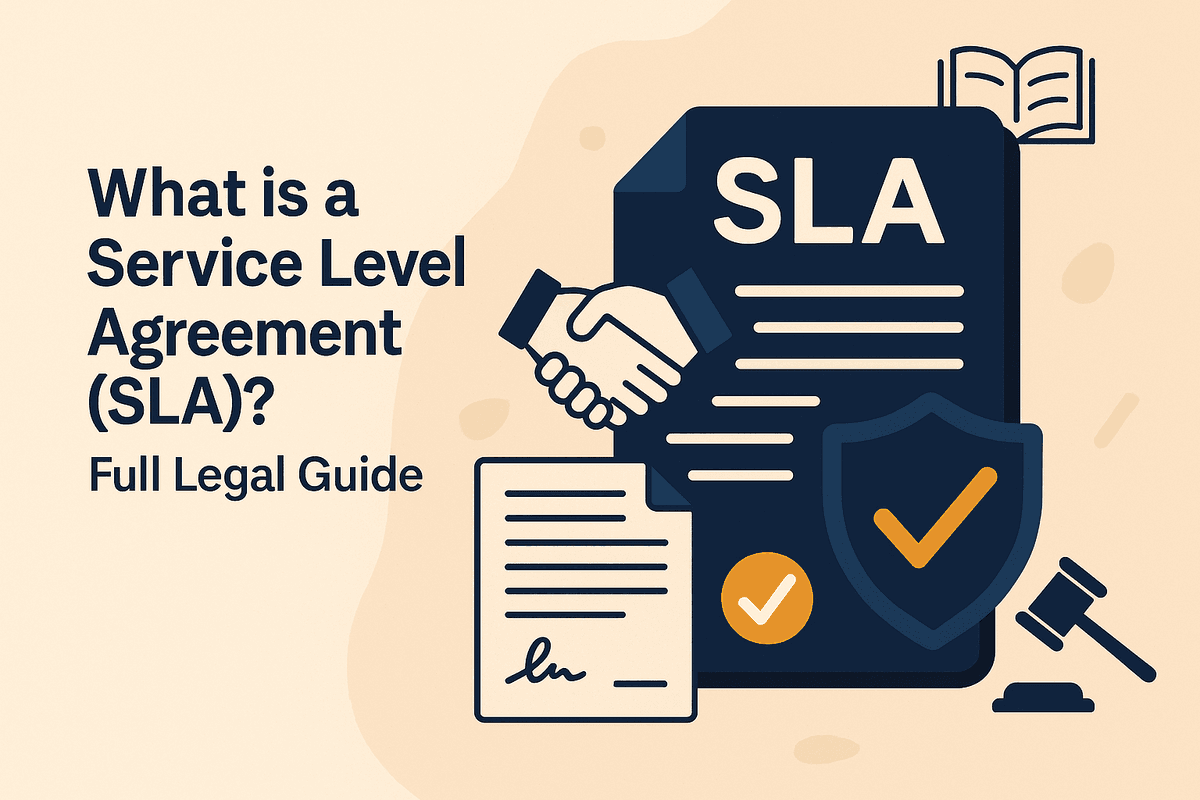What is a Service Level Agreement (SLA)? Full Legal Guide

Have you ever signed a business contract that promised timely delivery or guaranteed service quality? Chances are, it was backed by a Service Level Agreement (SLA). In India, SLAs are becoming increasingly common in IT, outsourcing, telecom, and corporate contracts. But what is a Service Level Agreement (SLA), how is it enforced, and what clauses should it contain? This SLA full legal guide by Vakeel Saab breaks it down clearly.
A Service Level Agreement (SLA) is a contract between a service provider and a client that defines the expected level of service, measurable performance standards, and remedies if those standards are not met. In India, SLAs are legally enforceable if drafted properly. They are critical in IT services, BPO contracts, and vendor management. This blog explains SLA meaning and purpose India, format, enforceability, types, penalties, and why Corporate Lawyers in India should always review them.
What is a Service Level Agreement (SLA)?
A Service Level Agreement India is a legally binding document that outlines service standards, responsibilities, and penalties for non-performance. It ensures accountability and reduces risks in long-term business arrangements.
- Purpose: Defines expectations and remedies in service contracts.
- Enforceability: Courts in India recognize well-drafted SLAs as binding.
- Flexibility: SLAs can apply to internal departments, external vendors, or multi-level engagements.
SLA Meaning and Purpose in India
The purpose of an SLA is to ensure transparency and measurable accountability. It gives businesses confidence that services will be delivered on time, within agreed quality standards, and with clear recourse if obligations are not met.
Key Clauses in a Service Level Agreement
According to Corporate Lawyers in Delhi, the following SLA clauses India are critical:
- Scope of Services: Details of services to be delivered.
- Performance Metrics: KPIs such as uptime, response time, resolution time.
- Monitoring and Reporting: How performance will be measured.
- Penalties for Breach: Monetary fines, credits, or termination rights.
- Confidentiality and Data Security: Protection of sensitive client data.
- Dispute Resolution: Arbitration or court procedures for SLA violations.
SLA Enforceability under Indian Law
An SLA is enforceable in India under the Indian Contract Act, 1872, if it meets standard requirements of contract law (offer, acceptance, consideration, lawful object). However, vague or generic terms can make enforcement difficult, which is why Corporate Lawyer Consultation is essential before signing.
Types of SLAs
SLAs can be structured in different ways based on the relationship:
- Internal SLAs: Between departments within the same organization.
- External SLAs: Between a company and its client/vendor.
- Multi-Level SLAs: Covering multiple services or departments with different tiers of obligations.
SLA Metrics and Performance Indicators
The heart of an SLA lies in measurable metrics. Common SLA metrics and performance indicators include:
- System uptime percentage (e.g., 99.9%)
- Average response and resolution times
- Service availability windows
- Escalation timelines
- Customer satisfaction benchmarks
Penalties for SLA Breach
Penalties for SLA breach can include monetary fines, service credits, withholding payments, or even termination of contract. Indian courts have upheld these provisions when clearly specified. To avoid disputes, businesses must ensure SLA penalty clauses are unambiguous and enforceable.
SLA vs Contract Template
While an SLA is a contract, not all contracts are SLAs. A standard business contract defines the legal relationship, while an SLA adds performance metrics and remedies for breach. Using an SLA alongside a Master Service Agreement (MSA) is a common practice in India.
SLA Governance in India
Effective SLA governance in India involves regular monitoring, audits, and reporting. Both parties should appoint relationship managers or committees to ensure compliance with service levels and handle disputes proactively.
How Corporate Lawyers Help with SLAs
Corporate Lawyers in India play a vital role in SLA drafting and enforcement. They ensure:
- Precise definitions of service obligations
- Compliance with Indian contract law
- Strong penalty and indemnity provisions
- Customized clauses for data security, IP rights, and confidentiality
With Vakeel Saab’s Corporate Lawyer Consultation, businesses can negotiate fair SLAs and prevent costly disputes.
Frequently Asked Questions (FAQ)
What is a Service Level Agreement (SLA)?
An SLA is a legal contract that defines service standards, performance metrics, and remedies for breach.
Are SLAs enforceable in India?
Yes, SLAs are enforceable under the Indian Contract Act if drafted clearly and with lawful consideration.
What are the key clauses in an SLA?
Scope of services, performance metrics, penalties for breach, confidentiality, and dispute resolution are essential clauses.
What happens if an SLA is breached?
The affected party can claim penalties, service credits, or terminate the contract depending on the agreement.
What is the difference between SLA and MSA?
An SLA sets service expectations and performance metrics, while an MSA outlines general legal and commercial terms of relationship.
Considering signing or drafting an SLA? Don’t take chances with vague terms. Vakeel Saab connects you with expert Corporate Lawyers in Delhi and across India who specialize in corporate lawyer consultation for SLAs. Book your consultation today to safeguard your business interests with a legally enforceable SLA.
Related Articles
The Importance of Consulting a Property Lawyer for Real Estate Issues
Blog
How to File a POCSO Complaint in India: Step-by-Step Legal Process
Blog
What punishments does the law give for giving, taking, or asking for dowry?
Blog
Reasons for the Increasing Divorce Rates in India
Blog
What is a Special Leave Petition? Meaning, Features, Process & & Who Can File?
Blog
What Is the Difference Between Mutual Divorce and Contested Divorce?
Blog